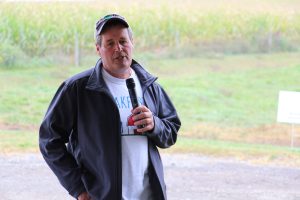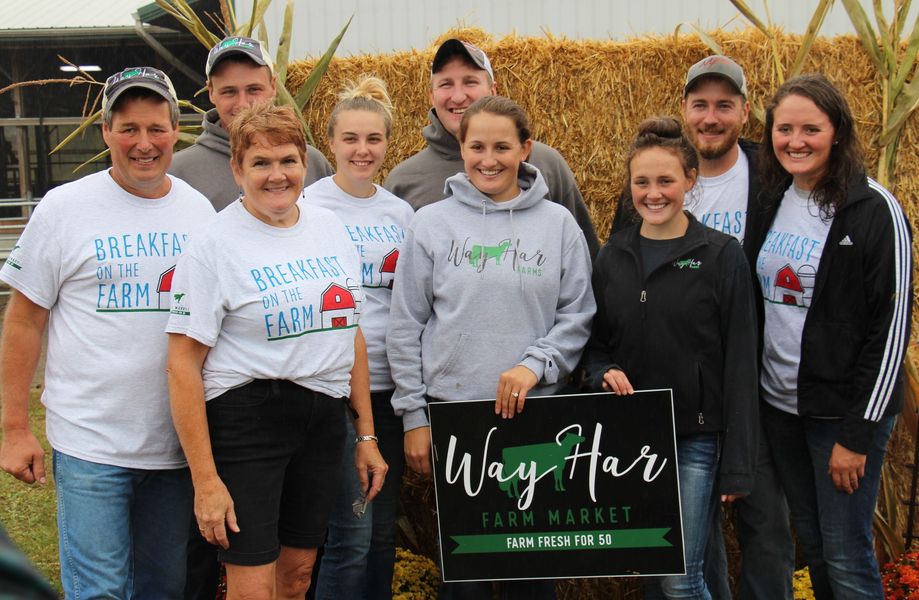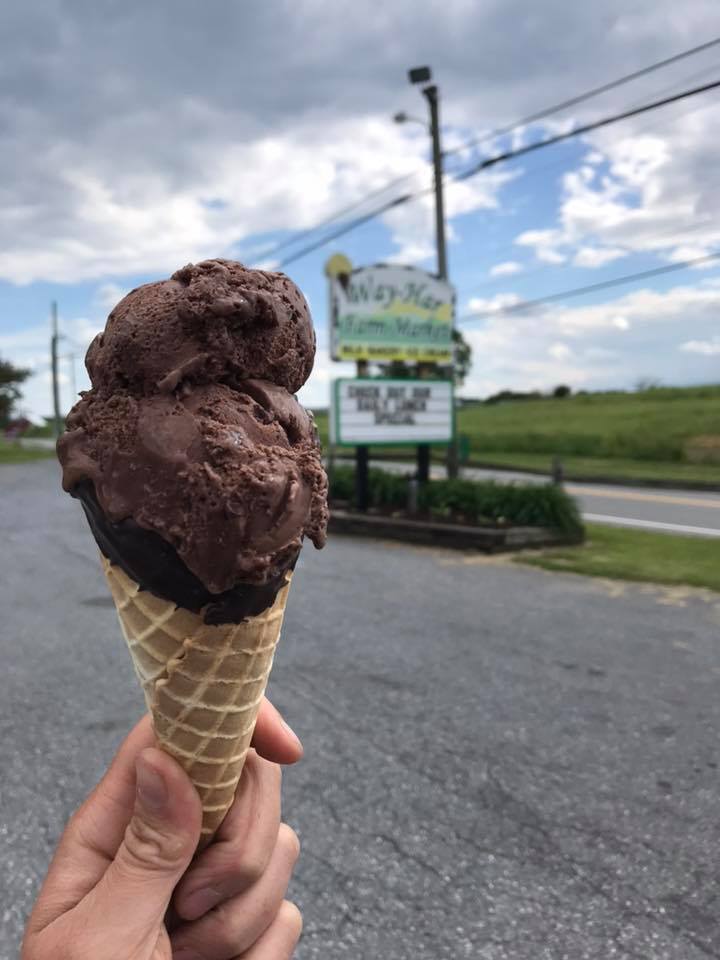
William Lesher Was Interviewed in the New Episode of “Cow-Side Conversations”
In the Center for Dairy Excellence’s latest episode of the “Cow-Side Conversations” podcast, William Lesher of Way-Har Farms in Berks County, Pennsylvania describes his family’s dairy operation and retail store – which started out as a small jug store in 1970 and now sells ice cream, bottled milk, baked goods and more. He shares his thoughts on an evolving marketplace with new customers and demographics, advice for getting started in the value-added business, and how to begin the transition process when your kids want to be involved in the business.
William opens the podcast by describing their 250-cow dairy operation and retail store. Both the dairy farm and retail store are located in Berks County in the middle of two big metropolitan areas. William’s grandfather bought the farm they are on now in 1952. In 1970, his father and uncle started Way-Har Farms Store where they jugged milk and sold ice cream. In 1990, William and his wife Lolly bought out his uncle and eventually became sole owners in 2009. Their two adult children, Josh and Jaylene, work alongside them. The family manages multiple other businesses – from custom harvesting and wholesale milk deliveries to managing VRBO properties.
At the farm level, William reflects on the investments they have made over the years, including a new dairy barn they built in 2015.
“2014 had high milk price and low feed price, so we pulled the trigger and built the barn in 2015. But then milk went to $13, so that changed our five-year plan of building a new parlor. We had to alter our five-year plan [again] when we were forced to build a new dry cow barn,” William explains in the podcast. “We had one collapse during a snowstorm. Looking back, it was a terrible experience but it was an old, uncomfortable barn. We’ve really seen a difference in our fresh cows since we built that dry cow barn. From the mattresses and manure channel to low ceilings for ventilation, it was one of the best things we’ve ever done – even though we were forced to do it.”
William says the next generation will decide whether they are going to build a new parlor or invest in robotic milking technology. The milk from the family’s 250-cow herd is processed and bottled in their plant and then sold at Way-Har’s retail store, which is their main market. Their core products are bottled milk and homemade ice cream, but they also sell breads, specialty pies and more at the store. The bakery has evolved to approximately 30 percent of their gross sales, second to ice cream.
“Ice cream is a fun thing. We’re up to about 60 flavors today. Our thing about ice cream is, you must keep it fresh,” William shares. “One of the reasons our ice cream is so good and so popular is that we don’t have it sitting in cold storage for 8-12 months of the year. We make it and it’s not in our freezer very long.”
In addition to a fresh, high-quality taste, this strategy helps them manage their bottom line. They do not have to tie up money storing the ice cream for long periods of time, and they do not have to pay for storage space. Aiming for about 14 percent butterfat with good mouthfeel, the team at Way-Har also creates seasonal flavors such as pumpkin, apple pie, eggnog and peppermint. The Leshers enjoy interacting with their customers and hold design-a-flavor contests, host ice cream making workshops, and even dip ice cream at weddings.
According to William, their long-term goal is to continue growing their milk market and retail farm market.
“Adding cows is probably not a thing we’re going to do. Especially with bringing on two family members, the growth is going to come from the retail end,” he says. “In our area, we’re down to three dairies in our township, which had all dairies at one time. We grow enough feed for our cows, but the options of expanding in the area aren’t that strong.”

Their retail store and farm market allows them to be creative and constantly adapt to an evolving marketplace. With their customer base and demographics in the area changing, William says they are currently looking into ways they can tap into some new, diverse markets.
“We’re working with a group to help us design a Spanish label to help us get into some of these Spanish corner stores. There’s a need for it,” William explains. “We’re also designing some flavors those customers like. I just can’t believe the large Spanish-speaking crowd that we have, and they are very good customers. We’re really working on tapping into that market.”
From a wholesale perspective, they also had to adapt and adjust accordingly throughout the pandemic.
“Before COVID-19 hit, we sold milk to about 30 local, family-style restaurants. Only about half of them opened back up again. Our retail store business was strong during COVID, but we lost all our wholesale business,” William says in the podcast. “Then, in March of 2020, all of a sudden everyone wanted to go to farmers’ markets. Those markets wanted to start carrying milk, so we picked up a lot of them. Some of them had never sold milk before, and a lot of those have continued.”

During the podcast, William also shares several pieces of advice for getting started with a value-added business model:
- Be prepared for the capital investment. “It takes a lot of money to do it correctly. If you really want to do it right, it could be a million dollars. You have to get your permits and get a building. It’s a huge investment, and you need to dedicate someone in the family that it’s their job. It’s a huge step.”
- Consider your location. “A lot of it depends on where you’re located. If you’re on a major artery near an upper scale town that’s willing to pay the premium that you need, it might be something worth considering.”
- Evaluate your opportunities for growth. “To me, [value-added] is one of the few areas of growth. I don’t mean to be down on dairy, but we are the only dairy left in the township that just has dairy cows as a source of income. I’m good with that because we have this retail farm market set-up. It would be okay if it was just my wife and I, and we had some type of exit plan. But we have some children who are very interested, so we need to plan for growth to bring them on.”
- Hire the right people. “We have excellent employees on our farm. When I wake up every day, I think, ‘How do we keep our employees happy and is everyone going to show up?’ We don’t have a lot of trouble with that. We’re also very fortunate with our market manager. We don’t have to spend hours on day-to-day tasks. She does all the hiring, scheduling, and runs the retail part very good.”
As they look to the future and have their kids join the partnership, William says they are in the very early stages of the transition process. Their kids are heavily involved on the management side, but they are starting to take steps on the financial side with cash flow analysis. Their goal is to be thoughtful and intentional throughout the process to ensure the next generation is positioned to succeed.
“We’re just starting the process. We have a pretty big machine with the retail and wholesale business, and obviously the farm and the land. We really want to do it right. We want to have our debt load at a good, manageable level that when we bring these partners in who want to take the next steps for Way-Har, they are positioned to do that,” William explains. “I don’t want them to have an easy road, because easy roads tend to make lazy people, but I don’t want them to have to struggle.”
From one generation to the next, William says they are focused on giving back and being active members of the community.
“One thing we’ve really tried to convince our children is that you have to give back to your community and to the dairy industry. I’m pretty proud of that,” he added.
To listen to the full podcast interview with William, visit www.centerfordairyexcellence.org/podcast. The podcast is also available on Spotify, Apple Podcasts, and Amazon Music. With a new episode released each month, William’s interview is the ninth episode in the third season. The podcast was designed to share real-time farmer insight, tricks of the trade, and inspiring stories from dairies across Pennsylvania.

